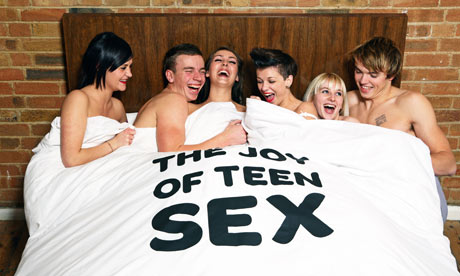
Society has always been reluctant to address teenage sex and its consequences, and the ongoing battle in parliament for compulsory sex and relationship education (SRE) in schools reflects this – Chris Bryant compulsory SRE bill is going through its second reading in the House of Commons. In any case, young people's sex lives need to be debated further. And Channel 4 is up to the task.
There's a shiny sheen of fakery glinting over The Joy of Teen Sex. Set up in a mock surgery, the programme's resident "sex coach" is actually a sex-toy saleswoman. The "teen sex reporter", Billie JD Porter, has a background in music journalism, not sex education. And the presenter, who was initially billed as a social worker, is now referred to as having a degree in social work: she isn't yet in receipt of her social work qualifications.
Following the programme, sex educators have come together to write a letter of complaint to Channel 4's commissioning editors, citing inaccurate statistics, misleading information and an unrelenting focus on techniques and products (from sex toys to the voyeuristic sex technique videos in the programme, commercialisation is everywhere). One example of those misleading stats – the often repeated statistic that 63% of girls aspire to be glamour models – stems from an unscientific survey carried out by a now-defunct PR company.
Criticising high-profile programmes about teenage sex education often means risking being written off as a prude. But does this programme actually speak to young people? The show isn't billed as educational but, despite that fact, many sex educators, agony aunts and researchers were approached by the programme makers prior to filming. It's possible that the programme's presenters have done everything by the book in regards to young people and sexual health, but the problem with the editing process is that we don't always see the full picture.
What is visible is the increasingly blurred line between sex as pleasure and sex as performance. The Joy of Teen Sex doesn't quite differentiate between the two. There is frank, honest advice about sexual health problems and contraception, but there are also questionable investigations into the performance aspects of sexuality, such as vajazzling and glamour modelling – activities that may boost self-confidence, but have little impact on physical sexual pleasure. And it's precisely this blurry line between appearance and reality that really needs to be addressed when talking to young people about sex. Only very vaguely did The Joy of Teen Sex touch upon the apparently taboo subjects of peer pressure, pop culture and pornography as a means of sex education, and the chronic problem of unrealistic expectations that these factors bring. Both mentions were by young people, and not by the doctors or sex coaches.
Sex researcher and agony aunt Dr Petra Boynton feels the programme wasn't really for teens, but for viewers in their early twenties – a post-Skins audience – which may explain why the programme was about more about sex entertainment than sex education. This is illustrated by the judgmental slut-shaming on display when a token teen interviews young women. When Porter witnesses the vajazzling process, she comments: "It's obviously not physically going to make her have a better experience, but if she suddenly is brimming with confidence and feels way better about herself then obviously that's going to do positive things for her sex life. I think that would do the opposite for me, if I had loads of rhinestones stuck to my vagina."
Boynton isn't the only one – Dave Lawrence, a sex educator from student-led Sexpression UK, has voiced concerns about the programme's emphasis on sexual technique and its potential to damage the progress of sex education in schools from those who oppose it.
Responding to complaints, Channel 4 issued a statement that includes the line: "Channel 4 has been committed to programming that addresses the lack and inadequacy of sex education in schools for many years through programmes such as the Sex Education Show and The Joy of Teen Sex." A commitment to sex education is all very well and good – as long as it's not sold down the river in favour of high ratings. With another series of The Joy of Teen Sex planned, will Channel 4 address these concerns?

